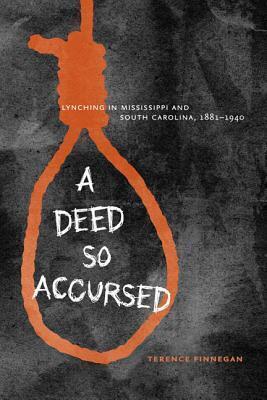
A Deed So Accursed: Lynching in Mississippi and South Carolina, 1881–1940
por
Terence Finnegan
Aún sin calificaciones
Formato
Tapa dura
Páginas
248
Idioma
Inglés
Publicado
Feb 11, 2013
Editorial
University of Virginia Press
ISBN-10
0813933846
ISBN-13
9780813933849
Descripción
In the turbulent decades following Reconstruction, the atmosphere in Mississippi and South Carolina was charged with racial tension and violence. Terence Finnegan delves deep into this dark chapter of American history, exploring the brutal reality of lynching that plagued both states from 1881 to 1940. His work shines a light on the systemic racism that allowed these acts of terror to flourish, leaving communities shattered and lives irrevocably altered.
Finnegan meticulously examines several high-profile cases, unearthing the stories of victims and the societal structures that supported these heinous acts. With a careful blend of historical research and personal narratives, he reveals how lynching became a tool of intimidation, maintaining the status quo and reinforcing white supremacy. The book is not only an exploration of the past but also a commentary on its lasting impact on contemporary society.
Through poignant insights and thorough documentation, the narrative invites readers to confront the harsh truths of this era. Finnegan's work serves as a stark reminder of the deep scars left by such brutality and the ongoing struggle for justice and equality that continues to resonate today.
Finnegan meticulously examines several high-profile cases, unearthing the stories of victims and the societal structures that supported these heinous acts. With a careful blend of historical research and personal narratives, he reveals how lynching became a tool of intimidation, maintaining the status quo and reinforcing white supremacy. The book is not only an exploration of the past but also a commentary on its lasting impact on contemporary society.
Through poignant insights and thorough documentation, the narrative invites readers to confront the harsh truths of this era. Finnegan's work serves as a stark reminder of the deep scars left by such brutality and the ongoing struggle for justice and equality that continues to resonate today.
Reseñas
No hay reseñas aún
Sé el primero en reseñar este libro y compartir tus pensamientos
Añadir Primera ReseñaRegistro de lectura
No se encontraron registros de lectura
Empieza a rastrear tu progreso de lectura para ver los registros aquí
Agrega tu primer registro de lecturaNotas
Registro de transacciones
No se encontraron registros de transacciones
Empieza a rastrear tus transacciones de libros para ver los registros aquí
Agrega tu primer registro de transacciones